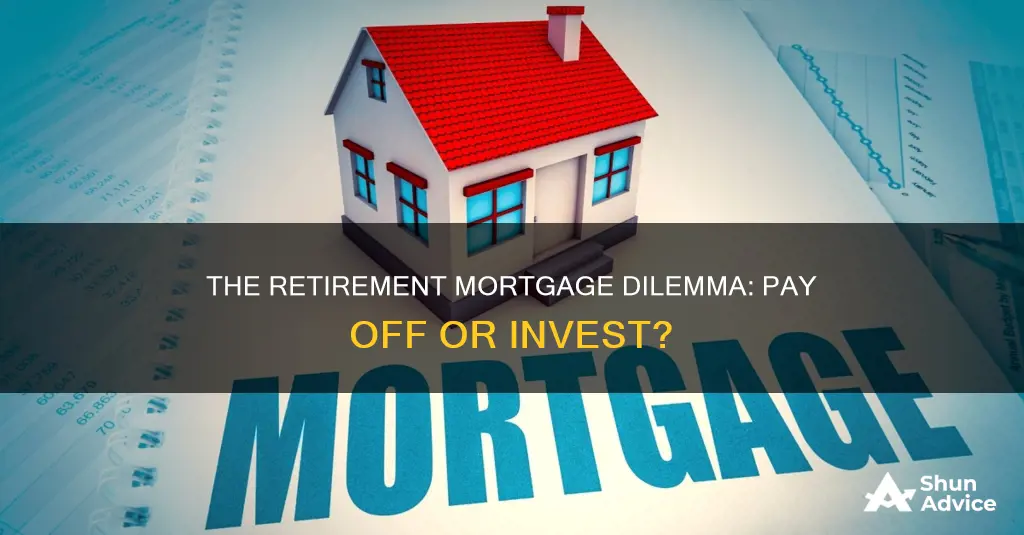
Whether retirees should pay off their mortgage or invest depends on their individual circumstances. For example, if a retiree has substantial retirement savings, paying off their mortgage may be a good idea. This can save them thousands of dollars in interest and provide peace of mind that they own their home outright. On the other hand, if a retiree needs to catch up on retirement savings or has low cash reserves, investing may be a better option. Additionally, the interest rate on their mortgage and the expected returns on investments are important factors to consider.
| Characteristics | Values |
|---|---|
| Interest rates | If your bank interest rate is less than your mortgage rate, pay off the mortgage. If your bank interest rate is more than your mortgage rate, keep the mortgage. |
| Retirement savings | If you have substantial retirement savings, it may be worth paying off your mortgage. |
| Downsizing | If you're planning to sell your home for a smaller one, you can apply the equity to your new home, resulting in a modest mortgage or perhaps no mortgage. |
| Tax-deductible | If you can benefit from the tax deduction on mortgage interest, it may be worth keeping your mortgage. |
| Peace of mind | Paying off your mortgage can increase flexibility in retirement and reduce stress. |
| Investment returns | If you can get a higher return on an investment than the interest on your mortgage, it may be worth investing instead of paying off your mortgage. |
| Retirement income | If paying off your mortgage would reduce your retirement income too much, it's generally not a good idea. |
| Cash reserves | If paying off your mortgage would leave you with low cash reserves, it's not advisable. |
| High-interest debt | If you have higher-interest debt, such as credit card debt, it's better to pay that off first. |
What You'll Learn

Paying off mortgage vs. investing: pros and cons
The decision to pay off a mortgage or invest depends on several factors, including income, mortgage size, savings, interest rates, and tax considerations. While some individuals may prioritise paying off their mortgage to reduce debt and increase peace of mind, others may opt to invest their money to potentially earn higher returns. Here are some pros and cons of each option:
Paying Off Mortgage Early: Pros
- Reducing baseline expenses: Eliminating a substantial monthly mortgage payment can be advantageous, especially for those with limited income during retirement.
- Saving on interest payments: Paying off a mortgage early can result in significant interest savings, depending on the loan's size, interest rate, and term.
- Peace of mind: Owning a home outright can provide a sense of security and flexibility, especially during retirement.
- Higher interest rate on mortgage than investment returns: If the mortgage rate is higher than expected investment returns, paying off the mortgage could be more financially beneficial.
Paying Off Mortgage Early: Cons
- Opportunity cost: Paying off a mortgage early may result in a loss of liquidity, as the money is tied up in the property.
- Tax considerations: Paying off a mortgage may impact tax deductions, potentially raising the effective tax rate.
- Retirement savings: Using retirement funds to pay off a mortgage early can reduce retirement income and push individuals into a higher tax bracket.
- Other debts: Prioritising paying off a mortgage may delay addressing other higher-interest debts, such as credit card balances.
Investing Instead of Paying Off Mortgage: Pros
- Potential for higher returns: Investing may generate higher returns than the interest cost of a mortgage, especially with low-risk investments.
- Diversification: Investing allows for portfolio diversification and the potential for long-term growth.
- Retirement savings: Investing in retirement accounts can help individuals maximise their retirement savings and take advantage of tax-deferred growth.
Investing Instead of Paying Off Mortgage: Cons
- Risk of losses: Investments carry the risk of losses, and higher-risk investments can lead to significant downsides.
- Volatility: The stock market and other investments can be volatile, and there is no guarantee of positive returns.
- Opportunity cost: Investing instead of paying off a mortgage may result in continued interest payments, potentially offsetting some of the investment gains.
Regression Analysis: Predicting Investment Returns
You may want to see also

The impact of income and tax on the decision
The decision to pay off a mortgage or invest depends on a retiree's financial situation, income, and tax position.
Retirees with a high income may have more deductions, such as charitable contributions, which could mean a lower effective mortgage rate. In this case, the tax deduction benefits of a mortgage are more valuable. However, if the retiree is taking the standard deduction, there is no tax impact with the mortgage, and they can simply compare the stated mortgage rate with potential investment returns.
Retirees should also consider the opportunity cost of paying off a mortgage early. If they can find an investment with a higher rate of return than the mortgage rate, they may be better off investing. Historically, stocks have delivered attractive returns that have outpaced inflation. However, investing in stocks or other assets comes with risk, and there is no guarantee of future returns.
Additionally, mortgage interest is tax-deductible, and paying off a mortgage early reduces this tax shield. For example, if a retiree has a personal tax rate of 24% and pays $14,857 in mortgage interest for the year, they would save $3,566 in taxes.
On the other hand, paying off a mortgage early can provide peace of mind and freedom from debt, which may be valuable, especially when approaching retirement. It also reduces the total interest paid over the life of the loan.
Therefore, the impact of income and taxes on the decision to pay off a mortgage or invest depends on a retiree's specific financial situation and tax position. Seeking advice from a financial advisor can help retirees make an informed decision that considers all relevant factors.
Rubles: Worth the Investment Risk?
You may want to see also

The importance of interest rates
Interest rates are a key variable for the economy and the stock and bond markets. They influence the cost of borrowing, the return on savings, and are a crucial component of the total return of many investments.
Pros of Higher Interest Rates for Retirees
Fixed-income investments tend to benefit from higher interest rates. Their yields—the interest they pay on investments—tend to rise when interest rates go up. These are investment options that typically provide a steady income stream and are lower risk than stocks.
Examples of fixed-income investments include:
- Certificates of deposit (CDs)
- Annuities
As interest rates increase, insurance companies that sell annuities also raise their rates. Therefore, if you buy an annuity after interest rates have risen, it will pay out more than if you had bought it when interest rates were low.
Cons of Higher Interest Rates for Retirees
Higher interest rates tend to hurt certain stock sectors. They are also connected to rising inflation, which can erode the growth of investments.
Higher interest rates translate to higher mortgage rates for new buyers. Typically, higher interest rates force home prices down. If you plan to sell your house before or during retirement, higher interest rates may make it harder to find a buyer and could force you to lower your asking price.
Stocks historically lose value during times of higher interest rates and tend to suffer more when high inflation is present.
Impact on Your 401(k)
Rising interest rates affect stocks and bonds differently. Bonds and other fixed-income investments tend to perform better than stocks in high-interest environments.
If you own mutual funds that invest in bonds inside your 401(k) plan, a rise in interest rates will likely lower their share price and net asset value.
What You Can Do
There are several steps you can take to keep your retirement planning on track during times of rising interest rates:
- Consider fixed-income investments such as money market accounts, CDs, and newly issued corporate and government bonds.
- Consider non-rate-sensitive stocks such as food, utility, consumer goods, and energy stocks, which are less sensitive to changes in interest rates.
- Review your portfolio to ensure your investments are balanced.
- Take advantage of higher rates by putting money into a high-yield savings account or an annuity.
Investments: Where Does the Money Go?
You may want to see also

The risks of investing
Investing is a great way to grow your money, but it comes with risks. Here are some of the risks retirees should consider before deciding whether to pay off their mortgage or invest:
Market Risk
Market risk is the possibility of investments declining in value due to economic developments or other events affecting the entire market. This includes equity risk, where the market price of shares fluctuates with demand and supply. For example, if there is a market crash, you could lose a significant portion of your investment.
Interest Rate Risk
Interest rate risk applies to debt investments, such as bonds. It is the chance of losing money due to changes in interest rates. When interest rates rise, bond prices in the secondary market fall, and vice versa. So, if interest rates go up, the market value of your bonds will drop.
Currency Risk
Currency risk applies when you own foreign investments. It is the possibility of losing money because of changes in exchange rates. For instance, if the US dollar depreciates relative to the Canadian dollar, your US stocks will be worth less in Canadian dollars.
Liquidity Risk
Liquidity risk refers to the ease of converting an investment into cash. Some investments may be difficult to sell quickly without accepting a lower price, or they may not be possible to sell at all. This risk is important to consider if you need to access your money in an emergency.
Concentration Risk
Concentration risk is the possibility of losing money because your investment is concentrated in one place, such as a single stock or industry. Diversifying your investments across different assets, industries, and geographic locations can help mitigate this risk.
Reinvestment Risk
Reinvestment risk is the chance of losing money by reinvesting principal or income at a lower interest rate. For example, if you buy a bond with a 5% interest rate and interest rates drop to 4%, reinvesting the interest payments at the lower rate will result in lower returns.
Inflation Risk
Inflation risk is the possibility that your investments will not keep up with the rising cost of living, eroding your purchasing power over time. Cash and debt investments, like bonds, are particularly vulnerable to inflation risk, while shares and real estate offer some protection as prices and rents can be increased.
Longevity Risk
Longevity risk is the risk of outliving your savings, which is a significant concern for retirees or those approaching retirement. It's important to ensure that your investments can provide a sustainable income throughout your retirement years.
Foreign Investment Risk
Foreign investment risk is the possibility of losing money when investing in foreign countries due to factors such as nationalization or political instability. Investing in emerging markets may offer higher returns but also carries higher risks compared to developed markets.
While investing carries these risks, it's important to remember that paying off your mortgage early can also have drawbacks, such as reducing your liquidity and potentially missing out on higher returns from investments. Consult a financial advisor to carefully consider your options and make an informed decision that aligns with your retirement goals and risk tolerance.
FTX Investors: Who Got Hurt?
You may want to see also

The benefits of paying off a mortgage early
Paying off your mortgage early can be a great option for some, but it's not always the best idea. Here are some benefits of paying off your mortgage early:
Peace of Mind
One of the biggest advantages of paying off your mortgage early is the peace of mind that comes with owning your home outright. Eliminating a monthly mortgage payment, especially before retirement, can provide a sense of financial freedom and reduce stress when considering living on a fixed income.
Saving on Interest
By paying off your mortgage early, you can save thousands of dollars in interest over the life of the loan. The earlier you make extra payments, the more you'll save, as you'll be reducing the principal on which you're being charged interest.
Increased Home Equity
Paying off your mortgage early increases the amount of equity in your home. This can be beneficial if you need to tap into this equity in the future through a home equity loan, home equity line of credit (HELOC), or cash-out refinance.
Freeing Up Cash Flow
Eliminating your monthly mortgage payment frees up extra funds that can be used for other financial goals or unexpected expenses. This can be especially beneficial for retirees who are living on a fixed income.
Better Budgeting
Paying off your mortgage early can improve your budgeting capabilities. Without a mortgage payment, you'll have more flexibility in how you allocate your money each month.
Potential for Higher Returns
If you have a low-interest mortgage, paying it off early could free up money that can be invested in higher-return opportunities. However, this strategy depends on market performance and is not guaranteed.
Kodak Stock: Buy or Pass?
You may want to see also
Frequently asked questions
Paying off a mortgage early can reduce your baseline expenses and save you money on interest payments. It can also increase your peace of mind and flexibility in retirement.
Investing your money instead of paying off your mortgage may generate higher returns than the loan's interest cost.
When deciding whether to pay off your mortgage or invest, consider your financial situation, the loan's interest rate, and how close you are to retirement. Consult a financial advisor or tax advisor for personalized advice.







